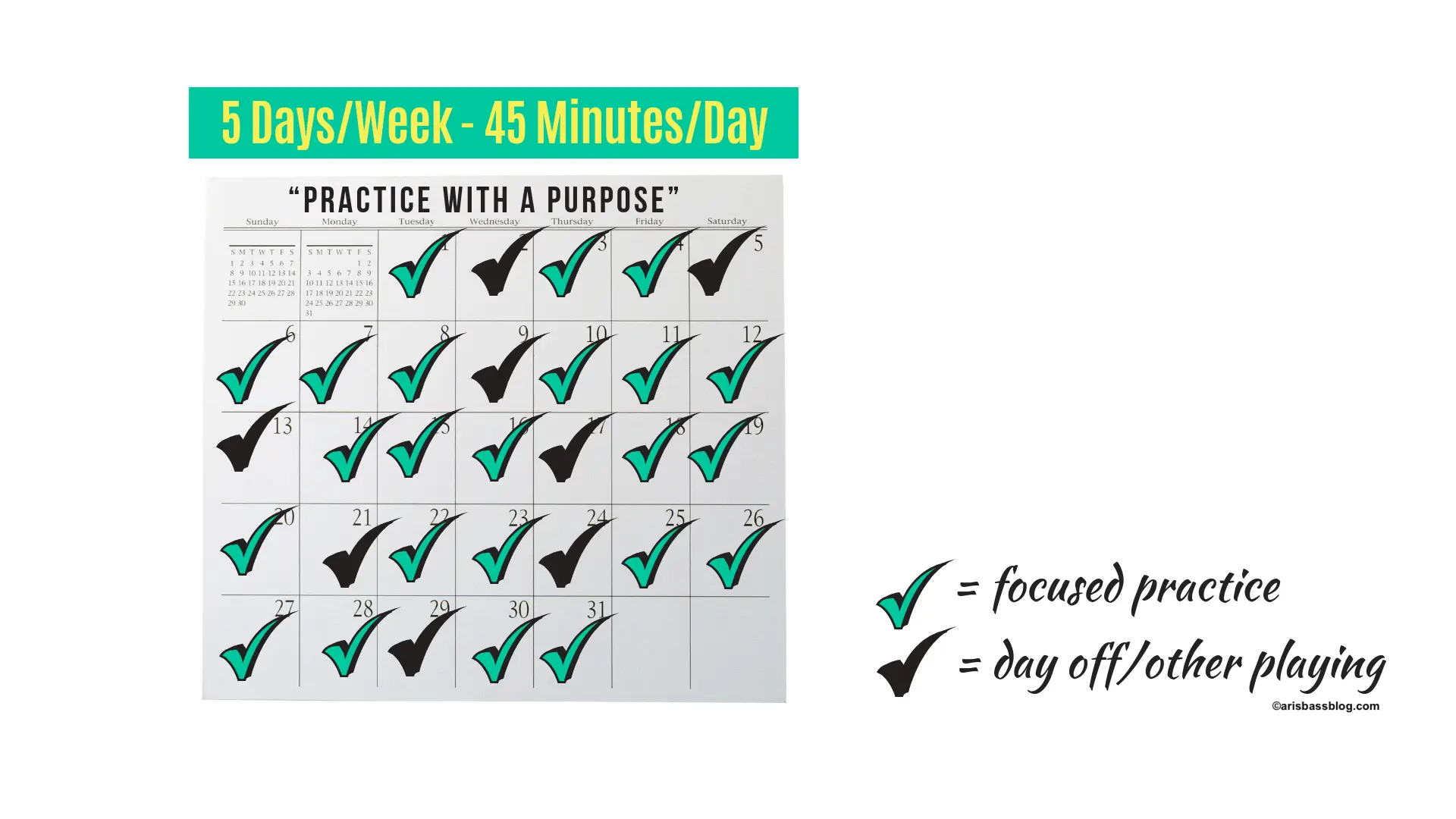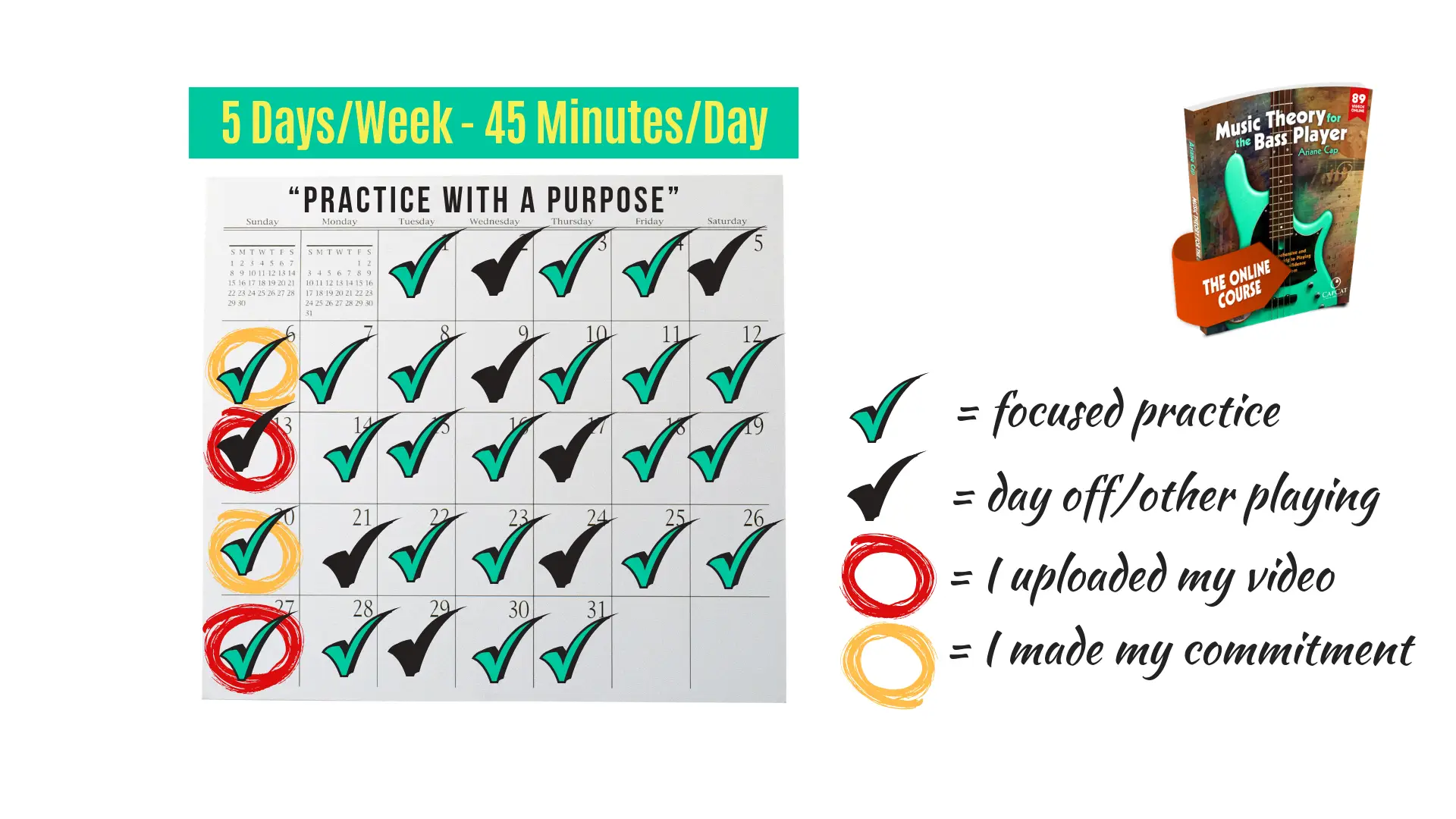Got a request to answer this question about pick use.
What do you think? Do you play with a pick? Your fingers? Both? Why?
Check it out, one of the questions I get a lot is
Most folks expect my answer to be something like “6 hours/day minimum, 7 days/week… ya know: eat, sleep and drink the bass, right?”
But the truth is a lot can be achieved by practicing the right way for 30-45 minutes, 5 days a week.
The right way is key – I have met many bassists who had clearly put the hours in, in bands or on their own, yet, they were frustrated by a plateau.
Get yourself a cheap wall calendar. Each day you practice, put a big red (in my example) check mark on the calendar. Do the same (with a black check) for your intended and planned days off. The off-days should never be back to back.

If you are part of a cohort, we do this together. We even include commitment/planning and post homework.
Yes, it’s very cool. In the cohort, it looks like this: 
Never break the chain of checkmarks! Enjoy!
Ari
My Music Theory course gives you small, bite-sized nuggets of information and practice tasks that move you forward incrementally (without wearing you out along the way!). It just makes sense that “doing the doable” is going to be much more effective than “trying and failing” to complete tasks that are too difficult or time consuming.
So get your calendar and markers ready to go in your music room.
One day at a time, one week at a time, and one check mark at a time.
Keep that chain of check marks unbroken!
And guess what? 10, 20, 30, 40 weeks from now you are going to look back and smile because you can see how much you have improved! Let’s do this!!
Also, check out these blog posts:
*To start out you can even use a technique such as tinyhabits.com – check it out, it’s free! Note: a 30-minute practice routine is not a tinyhabits method, but tinyhabits can get you there.
Grab your gear, we’re headed to the gym!
This workout does your fretting fingers good. Especially the little one of the bunch…
We cannot address the fourth/fifth finger separation problem often enough! They just do not like to move separately!
And to make matters worse,, the pinkie is by far the weakest of the bunch, so it needs a little extra TLC!
So let’s give it the kind of attention that it just doesn’t get in our normal daily lives – let’s strengthen it and help it to move independently from the ring finger.
This video is chock full of exercises and drills to increase the independence of the little one. Remember to take it easy, stay relaxed and don’t overgrip.
Here is the original post “The Pinkie Workout” on notreble.
In case you haven’t heard yet…
When you sign up for our Course, Music Theory for the Bass Player, you receive new material at a weekly schedule. We set the course up that way because it is really tempting to dip in and out here and there and to peek ahead. We focus you on a unit at a time, it is easier to stay on track and focused.
But many participants told us that one unit a week is a bit much. Our Course covers technique, theory, bass line creation, note finding exercises, styles study, practice techniques, eartraining, and many creative groove creation exercises. It is all presented step by step so you can easily follow along. Yet after a week, many said they longed for more time to spend with that unit.
We have heard your requests – voila, here I present:
Like the saying goes: “Slow and Steady wins the Race”:
Same course, slower pace – two weeks per unit!
This track also comes with a more relaxed payment schedule – you can now join for just 39.97 a month.
As always you retain lifetime access and our 20 day money back guarantee also holds here as well.
We have a really special program in beta right now – if you join the course by 1-20-2019 you get added to our New Year’s Cohort.
The cohort is all about accountability. With our and your peer’s help you can make it through the course with ease. There will be homework, public commitments and lots of additional support. Kicks off with the powerful Skills Assessment and a live webinar! You can join the Cohort at the Steady Track pace here.
PS: If you already are in the course and want to join the cohort, right now, you can. Click here and scroll down!
Learn more about the cohort in this post.
Find more info on the course here, including many testimonials from our participants. We really listen to what our students say. This course was first published in June 2016 and we have tweaked and added and improved and moved to a new platform and perfected over and over yet again since then.
Read testimonials and watch sample videos here.
We have many many testimonials from course participants. Here are a few for example:
And on and on people go, assuming that somehow knowing what you are doing diminishes your creative freedom while you are doing it. That it stymies your creativity somehow. That you are “cheating” or being “less original” if you actually know common chord progressions, scales, rhythms or how to read.
Let’s just say that I have never – not once – heard anyone who actually knows theory express a similar sentiment.
I have, however, heard plenty of amazing musicians say that they never had what you would consider formal musical training.
And I think that this is where the misunderstanding lies…
Hey, if Jimi, MJ, Danny Elfman…. say they never studied theory and they are THAT good – maybe I shouldn’t allow this stuff to get in the way of my true potential?
Let me stop you right there.
They may not have had formal study. They may not have gone through “every good boy does fine” or recited the cycle of fifths in both directions.
But it sure doesn’t mean that they did not have training or that they don’t understand theory!! Nor does it mean that they don’t consciously know what they are doing!
They all have had plenty of training, typically from a very young age!
They may not share the common language of music theory or know how to notate things – but that just means they came up with their own personal internal ways of organizing music. I know that if you play such an “ear player” things like the cycle of fifths or mediants or modal interchanges, they pick up on it instantly! So, they actually do know theory, and very well to boot, just not in the traditional, academic way and rather their own personal way!
But don’t take my word for it. Listen to what course participants of my course “Music Theory for the Bass Player” are saying about it:
The above bullets are also a roadmap for how best to strategize your practice. A good teacher will be able to help you with all of them and tell you precisely how to practice and strengthen each of them.
The stronger you are with the first four, the more freely #5 – the magic – can flow. Practice 1 through 4 systematically. To practice #5: sleep well, eat well, listen well, support others (on the bandstand and beyond).
And one more thing: the less tension you have in your hands and entire body as you play, the easier this elusive, magical place can be reached. It is never guaranteed, but with the right preparation, you can get there more and more often.